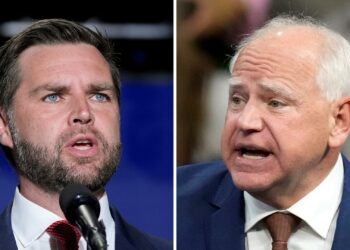In a highly anticipated showdown between Minnesota’s Governor Tim Walz and GOP challenger Scott Vance, the Walz-Vance debate held great significance for voters across the state. As the dust settles and the talking points are dissected, we examine the winners and losers of this pivotal face-off in USA TODAY’s exclusive analysis.
Table of Contents
- Winners and losers: Analyzing the key takeaways from the Walz-Vance debate
- Impactful moments that shaped the debate and swayed public opinion
- Recommendations for candidates to improve performance in future debates
- Insights into the strengths and weaknesses of each candidate showcased during the debate
- Q&A
- Insights and Conclusions

Winners and losers: Analyzing the key takeaways from the Walz-Vance debate
In the recent Walz-Vance debate, both candidates presented their arguments on key issues, leaving voters with much to consider as they head to the polls. Governor Walz showcased his experience and knowledge on various topics, while challenger Vance made a strong impression with his charismatic demeanor and bold promises.
Winners:
- Governor Walz: His command of the issues and calm demeanor resonated with viewers, solidifying his position as a strong leader.
- Education reform: Both candidates put forward innovative ideas on improving education, sparking important conversations on the future of our education system.
Losers:
- Challenger Vance: While he made a strong impression, some critics felt his promises lacked substance and feasibility, raising doubts about his ability to deliver on campaign pledges.
- Healthcare: Both candidates failed to provide concrete plans for addressing healthcare concerns, leaving voters with unanswered questions on this critical issue.

Impactful moments that shaped the debate and swayed public opinion
During the highly anticipated Walz-Vance debate, the candidates clashed on various issues, leading to impactful moments that have shaped the debate and swayed public opinion. One of the standout moments was when candidate Walz boldly called out Vance for his controversial stance on healthcare, citing statistics and personal anecdotes to drive his point home. This exchange resonated with many viewers and could potentially sway undecided voters.
Another moment that stood out was when candidate Vance stumbled during a question about foreign policy, struggling to articulate a clear stance. This fumble did not go unnoticed by the audience, and may have cost Vance some points in the eyes of the public. the debate was a crucial turning point in the election campaign, with both candidates having their moments of triumph and defeat.

Recommendations for candidates to improve performance in future debates
After analyzing the recent Walz-Vance debate, it is clear that there were both winners and losers on the stage. For candidates looking to improve their performance in future debates, here are some key recommendations:
Winners:
- Maintain a calm and composed demeanor
- Be prepared with specific and detailed policy proposals
- Engage with the audience by making eye contact and using relatable language
Losers:
- Avoid getting defensive or resorting to personal attacks
- Focus on answering the questions directly and clearly
- Work on improving speaking skills, such as articulation and tone

Insights into the strengths and weaknesses of each candidate showcased during the debate
During the Walz-Vance debate, both candidates had the opportunity to showcase their strengths and weaknesses on various issues. Governor Walz demonstrated a strong grasp of policy details and presented himself as a steady and experienced leader. His ability to articulate complex ideas in a clear and concise manner resonated with many viewers. However, some critics pointed out that he tended to rely too heavily on talking points and lacked spontaneity in his responses.
On the other hand, challenger Vance came across as energetic and passionate, particularly on topics related to economic growth and job creation. His ability to connect with the audience on a personal level was a highlight of the debate. However, some observers noted that Vance struggled with providing specific details on his policy proposals and often resorted to generalities. the debate provided valuable insights into the strengths and weaknesses of each candidate, setting the stage for a competitive election race.
Q&A
Q: Who were the winners and losers in the Walz-Vance debate according to USA TODAY?
A: USA TODAY noted Governor Tim Walz as the winner, while challenger Scott Jensen faced criticism for his performance.
Q: What were the key moments in the debate that influenced the outcome?
A: Governor Walz’s confident handling of questions related to his administration’s response to COVID-19 and public safety issues were crucial in securing his position as the winner. On the other hand, Jensen’s lack of clear policy proposals and his struggles in defending his past statements were seen as weaknesses.
Q: How did the candidates address important issues facing Minnesota in the debate?
A: Governor Walz emphasized the need for continued efforts to combat COVID-19, support for law enforcement, and investments in education and healthcare. Jensen focused on advocating for individual freedoms, reducing government regulations, and addressing public safety concerns.
Q: What were the reactions to the candidates’ performances by the audience and political analysts?
A: The general consensus among viewers and analysts was that Governor Walz appeared more poised and well-prepared, while Jensen’s arguments lacked depth and coherence. Some praised Walz for his strong leadership qualities, while others criticized Jensen for his failure to provide concrete solutions to the state’s challenges.
Q: what impact could the debate have on the upcoming election?
A: The Walz-Vance debate may influence undecided voters to lean towards Governor Walz, as he presented himself as a steady leader with a clear vision for Minnesota’s future. Jensen’s performance may have raised doubts about his readiness to lead the state, potentially affecting his support among voters.
Insights and Conclusions
the Walz-Vance debate showcased the candidates’ contrasting ideologies and policy stances on issues critical to Minnesota voters. While each contender had their moments of strength and weakness, it is ultimately up to the electorate to decide who emerged as the victor. As the November election approaches, it will be crucial for voters to closely evaluate the candidates’ plans for the state and make an informed decision at the ballot box. Stay tuned for more coverage and analysis on the gubernatorial race. Thank you for reading USA TODAY.






